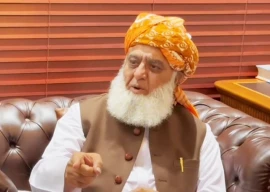
Jalaluddin is a British educationist who has been running a school in Orangi for the last two years.
Many times, he has almost packed up his bags and prepared to get out of Karachi after seeing bloody bodies and listening to the guns roar outside, but he always ends up staying back.
“Someone needs to run these government schools. No one wants to go to public schools and I want to change that,” he said.
Jalal adopted the government-run Qasimul Uloom School in Orangi’s Sector 11 in 2010. When he took on the management of the school there were only 60 students but now the number is seven times of that. By April 420 students were enrolled.
Like any educationist, Jalal also wants his school to excel in academics and sports. His aspirations seem to be bearing fruit as the taekwondo team from his school clinched first prize in the Hamara Karachi Festival held in March.
But why come to Pakistan with 33 years of experience in primary-school teaching? “If my wife was from Somalia I would have moved there,” Jalal joked, his grey eyes twinkling. His wife is from Karachi. Jalal was born in Birmingham but later moved to London. At 43 he embraced Islam and a little while later married a Pakistani woman.
“Once my wife’s uncle came to visit us and he talked in detail about Pakistan. It raised my interest,” he said. His first week-long visit to Karachi was in 2001. He saw the ‘appalling’ condition of government schools and he knew he had to play a part. So he took early retirement in 2003 and came to work in Karachi’s ghettos. In 2010, while campaigning for a hepatitis B vaccination programme with a British charity, he stumbled on the government school which he currently runs.
“The campus was empty and we came to know that school classes were being held in an empty madrassa nearby.”
Jalal sought help from the education department and convinced the students to shift back to the school from the madrassah. Gradually he started renovating the building and then formally adopted the school in 2011. There are now 19 teachers in the school and 16 out of them are paid by Jalal while the remaining are government teachers.
Besides funds, the biggest problem for Jalal is the language barrier since the school is Urdu-medium. “It’s frustrating for me that I can’t teach here,” he says. “I have picked up words of Urdu but I can’t teach.” Another problem is violence which is relatively more frequent in Orangi than the rest of the city. “So far the school has managed to stay aloof from politics. I get frustrated when violence affects the children’s studies,” says Jalal. “A talented girl wanted to move away from this area after her father was stabbed.”
The solution to change how things are run in government schools, which Jalal calls ‘dreadful and appalling’, is that the people should come forward and own them. “I believe that every government employee should send their children to a public school. Only then will things change.”
Published in The Express Tribune, May 25th, 2012.
COMMENTS (13)
Comments are moderated and generally will be posted if they are on-topic and not abusive.
For more information, please see our Comments FAQ

1720097164-0/BeFunky-collage-(9)1720097164-0-165x106.webp)





1727951792-0/Copy-of-Untitled-(82)1727951792-0-270x192.webp)
1724320236-0/Untitled-design-(6)1724320236-0-270x192.webp)

1727939945-0/Copy-of-Untitled-(78)1727939945-0-270x192.webp)






Perhaps some of us must emulate Jalaluddin's example. Those in Karachi could offer to help if he needs assistance. Rather than justifiably lament about our leaders apathy perhaps we may show active interest and try to replicate the model in other areas and to other schools. Jalal sahib how may I help?
A white man feels more pain for our children then our own politicians and leaders. Says alot about us as a nation.
Thank you Mr. Jalaluddin for doing all the hard work which a Pakistani educationist won't do.
Pakistani educational institutions are made to make quick buck, not for educating the children.
Bureaucrats won't send their children to public schools as they earn a lot of money every month, not only from their salaries, but also under the table.
Why would any bureaucrat will send to his children in public school when he can afford to pay the tuition of any highest standard and expensive private schools, not only in Pakistan but also in foreign countries.
All Government Employees should send their Children to Public Schools, and All, along with their Families should only travel in Public Transport. Both these most neglected sectors of our society will transform into World Class Institutions within Five Years.
Spot on - if the rich in this country do not send their own children to government schools, things wont change. An example is Aitchison, which is a semi-goernment school. It gets millions of rupees grants from government - very recently Governor of Punjab "donated" huge amount, from government funds. So why not the same money for primary schools? Because children of all these self-proclaimed educated guardians go to Aitchison. And children if the poor go to government schools.
Thank you sir!! Tussi great ho!
Poor area schools are also negelected in West. Look at this example from NYC which has budget exceeding that of Pakistan and under 9 million people: Here is an example from one of those schools NYC had its poor kids in. http://www.dailymail.co.uk/news/article-2008418/Teachers-attacked-halls-mouse-droppings-desks-Welcome-School-Hell.html Teachers attacked in the halls, mouse droppings on the desks: Welcome to the School from Hell Meanwhile as of 2011, these kids are part of the new majority population of the country
Dear Mr. Jalaluddin, Sir, Thank you very much. We need people like you. We do not want to beg for fish to eat. We request you to teach us how to fish. That is exactly what you seem to be doing. Thank you once again.
Thank you for your efforts Mr Jallaluddin.
Hard to find great men like him these days
I appreciate his commitment and dedication for spreading education in underprivileged area.
Don't forget the hospitals and public transport.
Thanking you, from bottom of my heart.